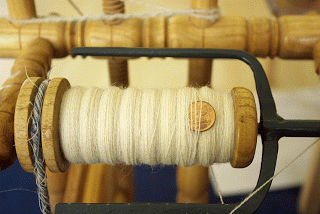A while ago, I mentioned that I've done a bit of wheel spinning again for a change. After a long while (felt like forever) of spinning to more or less fill two bobbins with single, I'm now in the plying stage.
This
is what it looked like after two hours of plying work. After three and a half hours of plying, the bobbin was more than full - it had a bulge in the middle. (Of course I forgot that I wanted to take a picture. Only natural to grab the swift right away, right?) The result is 595 metres of 2-ply yarn, and it's roughly about 28 wraps per inch. Since I gave it a soak right away to relax the fresh ply, I can't weigh it yet, since it's not completely dry this morning.
However, the plying time has made me think about pricing of handspun yarn again. Six hundred metres of yarn took three and a half hours of plying. If I do a very rough calculation and suppose that spinning took one and a half times the work time of plying (I'll time a bit of spinning next time), then that means roughly fourteen hours of work total. That is one and a half workdays for sixhundred metres two-ply! And that's wheel spun with industrially prepared merino wool, so no additional prep time required plus a relatively fast and efficient spinning tool.
Fourteen hours work - now what would you pay for a skein of handspun wool like that? Probably not my normal hourly rate times fourteen, and my normal hourly rate is not very high at that. And if you look at etsy or dawanda or any other shop, stall or market, you can see handspun yarn roughly half the length offered up for less than 20 Euro. (Oh, it's hand dyed as well.) Spinning rates seem to go up to a stunning 20 cents per metre - but you can have it cheaper, too.
Now, my little wheel is not the fastest one on this earth, and I'm not trying to spin as fast as humanly possible. But let's do some maths. One hour spinning and plying time taken together will let me end up with about 42 metres of two-ply yarn. If I sell that for 20 cents per metre, I will end up with the stunning sum of 8,40 Euros for one hour of my work. Plus the material needed - and I also need the tool to work with, of course. So let's say eight of the Euros remain as "winnings".
And now there's the snag. While 8 Euro per hour might sound not too bad at the first second, what you technically are as a spinner is... a freelancer. And that means you will have to calculate so that you can pay everything yourself - your health insurance (where usually your work/your boss will pay half, if you have a fixed job), your working tools, your stockpile, your vacations; you will need to make enough money so you can cover the times you are ill or some time off that you need to recover and recharge your batteries. Oh, and maybe some day you wish to be old and pensioned? Go pay for your own pension account, then. And if you make enough money for all of that, keep in mind that you will also have to shunt off the VAT from your selling price - and that's between 15 and 21% in Europe. (In Germany, those 8,40 Euros would mean 7,05 Euros for you.)
That is much, much too little money for that work. Ask any freelancer. Go read any freelance advice column, or webpage. And too little money for work - that's not healthy, and it's not good for the economy nor society. Plus too little money for textile work also furthers the underestimation and the undervalueing of this line of work that is so widespread today.
So... provided every spinner around that sells his or her own handspun yarn (and I'd bet it's mostly female spinners here) doesn't work at least three times faster on their spinning wheels than I do... they sell their work under price. Vastly under price.
That always leaves me more than a little sad. Hand spinners, please value your work correctly!
